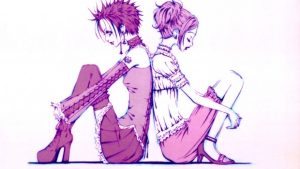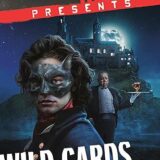[Image from animedepot.net. Nana belongs to Ai Yazawa and Shueisha.]
I would like to come forward with a confession: throughout most of college, I largely had to put my anime love on hiatus – not necessarily because I didn’t like it anymore, but because my life had become full of new experiences and growth. Toward the end of my final year, I wanted to jump back on the bandwagon; I missed the joy I had experienced from reading my favorite manga and watching my favorite shows. The unfortunate truth, though, was that I was having a very hard time identifying with anime. All the new stuff was working off of old cliches, so I turned to the golden oldies and rewatched series like Yu Yu Hakusho and Lupin III, this time with a partner who hadn’t had nearly as much exposure to the world of anime, save for Akira and Cowboy Bebop (so obviously, he already had high standards…).
We had been able to find a few really good series that we could both enjoy, but I still felt something was missing for me. I was a young woman who had grown incredibly in four short years, and who needed larger themes that related to her life. I took this position with Amazing Stories as a step toward forcing myself into discovering series that truly resonated with me, and that could help inspire me to write and draw again with the confidence and abundance that I had in high school.
After blogging here for only a short time, my efforts have not been wasted. I have found Nana.
Written by Ai Yazawa and premiering in Cookie magazine in 2000 (and then debuting as an anime in April of 2006), Nana tells the story of two young women who meet by chance on a train ride to Tokyo – both of whom are named Nana (which is one of the words for “seven” in Japanese; the number seven is considered an unlucky number because it’s other name, “shichi” uses the sound “shi,” which means death). These ladies couldn’t be more opposite: Nana Komatsu, the story’s protagonist, is moving to Tokyo to tag along with her boyfriend and college friends who all moved there a year before her. Nana Osaki is moving to Tokyo to pursue a career as a professional punk singer; her boyfriend had also moved to Tokyo the year before to make it big as a guitarist, but she chose to separate herself from him and become a successful musician in her own right. So while Nana K. has none of her own ambitions but to be in love and close to her boyfriend, Nana O. is trying very hard to neglect her desires for love in order to prove that she doesn’t need a man’s support. Though they separate after their train ride, the two run into each other again while apartment-searching and promptly decide that fate has called them to move in together.
I think it’s fair to say that Nana has a seemingly very typical woman-centric plot, full of romance and drama. But I can assure you that I am no real lover of needless romance stories, and that the love discussed and dealt with in this series focuses a lot more on the emotional rollercoasters that the titular characters are undergoing. These are not love fantasies; these are real relationships that would cause any female viewer with romantic experience to shiver with understanding. The ladies need to learn how to be independent while also feeling tied to men that they truly care about. For them, life is very black and white: You’re either your own woman, or you belong to a man. The balance between these conditions is very difficult for many women to strike, even today – in Japan, and also in the United States.
The visual style of Nana is also very intriguing. It is certainly very easily identified as falling into the genre of anime, but there are some key differences in the artistic style employed in the animation. Ai Yazawa has very distinctive artwork, and the animators did a great job of bringing her high-fashioned, long-lashed characters to life. My only complaint in terms of visuals is that everybody is so freakin’ skinny, but I think that comes from Yazawa’s interest in the world of fashion, where everyone is shaped like a hanger. The colors are vibrant and beautiful, and the animation is smooth. The music-making scenes leave a little to be desired (its certainly not like the gorgeously-rendered drumming scenes from Kids on the Slope), but I’m overall satisfied and drawn into the action.
While Nana is obviously geared toward a female audience, and the trials of the characters are more relatable to young women, I think it’s very good about having a flexible storyline that anyone can enjoy. In fact, I like to think that it’s the kind of series that can draw a male audience in, as well, and help them to understand the kinds of decisions women have to make concerning their happiness, independence, and desires.
Fair warning: The series starts off relatively light-hearted but gives you plenty of heartache and tears along the way. The ending is confusing and possibly unsatisfying; in fact, my major complaint about the entire series is that I wish there was more of it. To be fair, the anime only covers the first twelve digest novels in the series, and there are upwards of twenty currently published. Ai Yazawa has been suffering with medical issues for quite a few years now, so there is no real way of knowing if the story will progress on, and if that will all be included in another season of the anime.
Though Nana is considered shojo (young girls’) for some reason, I would actually say it’s josei (for women 18+). There is definitely some foul language and sexual content, but more than that, I think that an audience much younger than that wouldn’t be able to fully understand or appreciate the decisions or hardships that the Nanas must confront.
All 47 episodes of the series are available on hulu.com. It’s also worth mentioning that there are a few live-action movies available, which I have yet to watch, as well as musical albums which have been inspired by the series. Music is, in fact, one of the central themes to the series that I didn’t touch upon much in this review, but the opening and ending credit songs are some of the best songs I’ve heard in anime for quite some time (Yoko Kanno’s work excluded).
If you like punk rock, gratuitous but well-spoken Jenglish, girls who have to overcome insurmountable odds, and/or heartbreaking stories, Nana comes highly recommended. Happy viewing!












I haven't previously read much Manga, but I've always been interested in the style of the art. As a teenager, I followed Marvel comics because I increasingly identified with the more adult themes in their angst-ridden characters.They were more real, more tangible to my life than other venues. Which, it seems, from your comments, that certain Manga storylines have more depth than I imagined. You have have piqued my curiosity.
There are definitely some very sophisticated, mature manga available. In the West, we still tend to lump anime and manga into the "for children" category, when the truth is that there's a lot more that's available for adults with adult themes (much like comics in the States). Nana is a good example of this. Finding manga that is more mature can be difficult in the States because most publishers also want to target a young audience. http://www.mangafox.com has fan translations of manga that has not been licensed in the U.S. You can search based on specific categories or types of manga; I would caution you to be careful, because you might happen on themes that are even more adult than you intended upon! If you have questions about what certain categories mean, they're easy to look up on Wikipedia, or you can ask me. =]
Paradise Kiss is an all-time favorite of mine, but I never could get into Nana. The last time I tried was like…3 years ago, though, so I think I'll give it another chance!
Definitely try out Nana again! It might be different for you now that you're also trying to figure out what the heck is going on with your life, haha. I'm hoping to get into ParaKiss soon, myself. =]
I'm down. This sounds rad. I have a fairly new affinity for Japanese punk and this sound right up that alley. If you haven't seen it yet (and if I already hadn't suggested it to you), watch the 2009 live-action film called Fish Story.
It's about the "first" Japanese punk bank that records a song in 1975 that ends up saving the world through a variety of circumstances and coincidences. It's ridiculously awesome.
You did mention Fish Story – I have yet to check it out. And you should listen to the band Shonen Knife at some point. They're an all-lady band from the late 80s/early90s. They opened for Nirvana a couple times. =P
I do occasionally listen to Shonen Knife! They're rather badass.